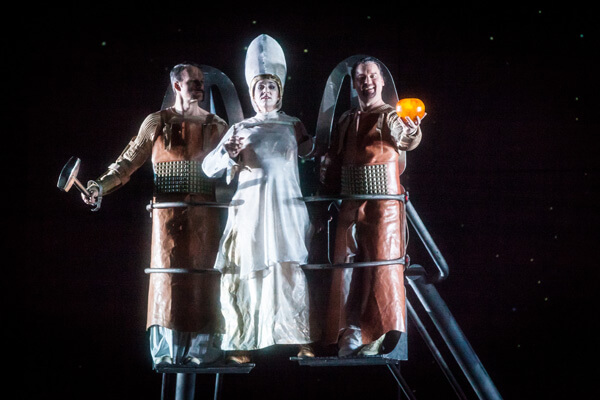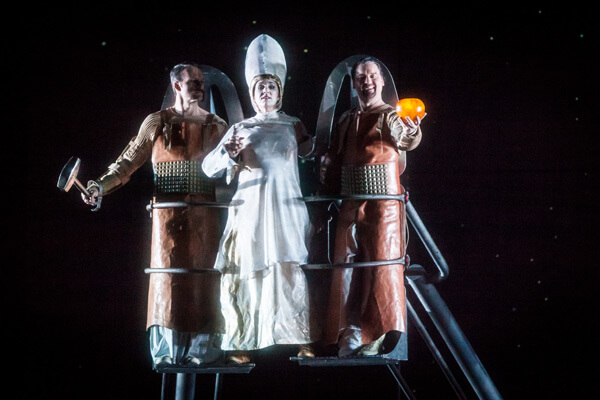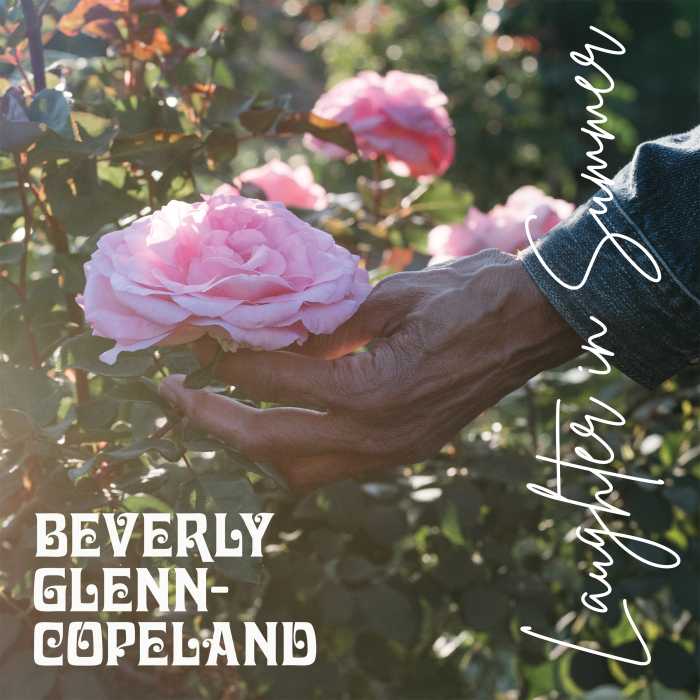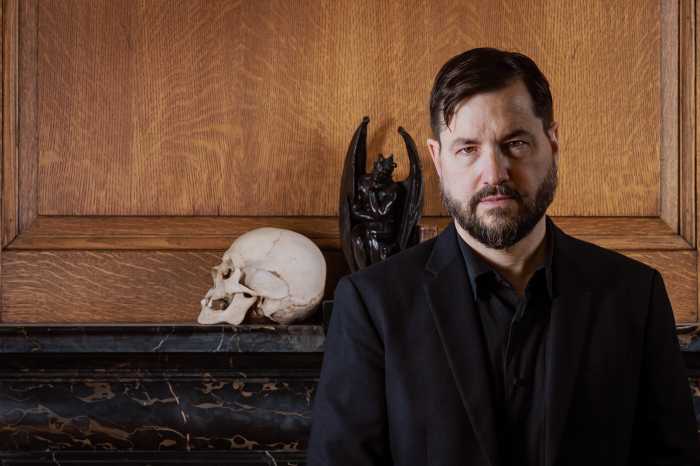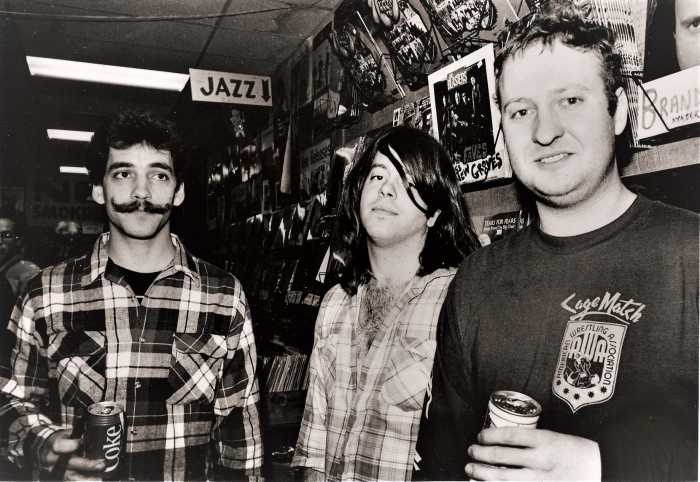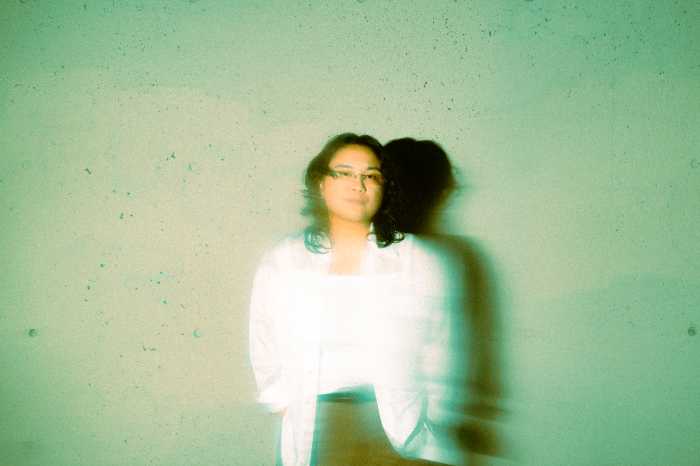Ryan McKinny, Melody Moore, and Chad Shelton in the Houston Grand Opera’s production of “Das Rheingold.” | LYNN LANE/ HOUSTON GRAND OPERA
A highlight of most vocal music seasons is Manhattan School of Music’s annual Senior Opera Theater production. Director Dona Vaughn and conductor Jorge Parodi work miracles with the talented but largely inexperienced undergrad singers, and the chosen repertory often fascinates.
Francesco Cavalli’s 1645 “La Doriclea” (March 26) was a wise choice in terms of vocal demands and size of cast. Besides three acts of military plottings and amatory confusion in ancient Asia Minor, there’s an allegorical prologue plus some divine messings-around with the action. Parodi had imparted at least the basics of 17th century style to his pit band and singers — and the score, largely recit and arioso, proved lovely. One could see three of the singers swiftly moving into Young Artist Programs. As Doriclea, Bryn Holdsworth disclosed a striking dark timbre and instinctively musical, communicative phrasing — a Penelope in the making. Caroline Dunigan captured the moods of the princess who falls for Doriclea in male drag, singing with remarkably pure and intriguing light soprano. As Doriclea’s royal husband Tigrane, Gina Perregrino showed an attractive mezzo, performing with complete conviction.
Most impressive among the secondary leads were baritone Justin Austin, mellow-voiced and impassioned as the servant who forgets himself with love for his queen and then betrays her, and rich-voiced mezzo Lisa Angela Barone as the sensible maid Melloe. Other particularly noteworthy voices in small roles included Molly Boggess (Ambition), Sarah Michal Shiovitz (Discord) and Kyle Gee (Clitodoro).
Opera in New York and Houston
April 10 marked the yearly return of Barbara Frittoli to the Met, as this season’s fourth Mimi in “La Bohème.” The Italian soprano, always a responsible artist, kept her voice very reined in; when she let it out at climaxes one heard why. High notes brought on tension, wow and flutter, and downright flatness. Where she could turn her weakness to advantage as the dying seamstress, Frittoli did, but her whole performance seemed understandably preoccupied with skirting disaster. She did, just — though the unimpressive Stefano Ranzani gave little help in the pit.
Jennifer Rowley’s Musetta, audible even amidst throngs, was more accurately and vibrantly sung than most; if she went for brash vulgarity in Franco Zeffirelli’s circus-style Act II, it’s hard to blame her. Act IV’s prayer augured well for more substantial assignments.
Vittorio Grigolo, handsome and childishly hyperactive, alternated attractive moments with punched out lines and words, “underlining” almost everything, playing havoc with note values and rhythm. He could be a valuable artist if he’d find more musical discipline. Otherwise, only Patrick Carfizzi’s plucky Schaunard belonged onstage.
Houston Grand Opera has impressively launched the “Ring” Cycle it will share with Valencia and Florence. The performance collective La Fura dels Baus — a Catalan high-tech, video-enhanced Cirque du Soleil-like outfit — guaranteed a visually stunning spectacle (if occasionally overbusy; the Furans never deploy props or scenery when 30 writhing mimes are available), which suited the fairy tale aspects of “Das Rheingold” (April 13) very well. How the production copes with the more complex human emotions and interactions “Die Walküre” brings forth remains to be seen, but this first installment renewed one’s interest in the work so trivialized and hemmed-in by the Met’s depressing “Machine.” HGO’s orchestra, while no match for the Met’s, played extremely well for Patrick Summers — with the exception of the prominently slurry brass, something it takes more years playing Wagner to allay. Summers lived up to his reputation as a singer’s conductor with an almost uniformly strong cast.
Scottish bass Iain Paterson wanted a bit more majesty and presence as Wotan but has the idiom mastered and displayed a warm, wide-ranging voice with pleasing legato.
HGO regular import Christopher Purves showed his substantial singing-actor virtues from the first (more than usually wet) scene with the valiant Rhinemaidens. Vocally, the afternoon’s prize went to Jamie Barton’s plushly phrased Fricka. Locally developed Chad Shelton and Ryan McKinny — a next generation Wotan, one imagines — proved unusually impressive as Froh and Donner, as did Melody Moore as a welcome non-shrill Freia. Meredith Arwady’s incisive Erda showed increased artistry and verbal point. Stefan Margita’s Loge entered to chuckles on a Segway; despite some interpretive finesse he wore out his welcome through self-indulgent mugging and a rather decadent-timbred tenor. (Margita and Purves both cackled loudly too often.)
The only real demerit was Andrea Silvestrelli’s nearly unlistenable Fafner. This wavery, sepulchral bass divides reaction like anchovies. By contrast, Kristinn Sigmundsson’s craggy bass supplied a terrific Fasolt.
HGO’s “Walküre” (April 18-May 3, 2015) promises — besides Paterson and Barton — Christine Goerke’s Brünnhilde and Karita Mattila’s Sieglinde. Plan travel now.
Back at the Met, two bel canto works held sway. “I puritani” (April 17) remains among the company’s dullest, most idea-free stagings — static dioramas out of an ancient “Victor Book of the Opera.” Only great singing can ignite it. Lawrence Brownlee’s Arturo, though slightly indisposed, alone really went the distance — commendable diction and phrasing, spectacular ease on C sharp and D (the high F at least put in an appearance), and a consistently engaging timbre: quite amazing.
Debuting soprano Olga Peretyatko made little impact emotionally — she knew what her words meant but did not own them sufficiently and, though very lovely physically, offered a routinely picturesque, twirling/ drooping kind of performance. With some real direction in other venues, she’s done fine work, and the voice — while not enormous or perfect — is extremely beautiful, at least up to D. Staccati and messe di voce — rather than trills, flawless descending scales, or long legato arches — seem to be her strongest suits technically. Not a game-changing acquisition, she’s very talented; one hopes the Met offers her Constanze.
Mariusz Kwiecien being ill, the plummy baritone part went to Belarus’ provincial-sounding Maksim Aniskin, who soldiered on professionally to little avail. Though lacking imposing bottom notes, Michele Pertusi (Giorgio) provided classy legato and native Italian. Elizabeth Bishop provided a more substantial-sounding Enrichetta than usual.
Michele Mariotti led with very welcome alertness and style.
Fabio Luisi in April 25’s “Cenerentola” proved more buttoned down, but led a very fine performance musically in spite of Eric Einhorn’s grotesquely overdone “Lucy Show” outtakes-style direction. The evening’s emotional content derived entirely from Joyce diDonato’s splendidly vocalized, enchantingly acted heroine, full of subtle dynamic and verbal touches despite the circus swirling around her.
Luca Pisaroni’s Alidoro and Pietro Spagnoli’s Dandini both rewarded acquaintance. An affable Prince, Javier Camarena showed a lovely voice with wonderful high notes, proving a first-class Bellini/ Donizetti singer coping manfully with Rossinian agility via aspiration.
David Shengold (shengold@yahoo.com) writes about opera for many venues.

